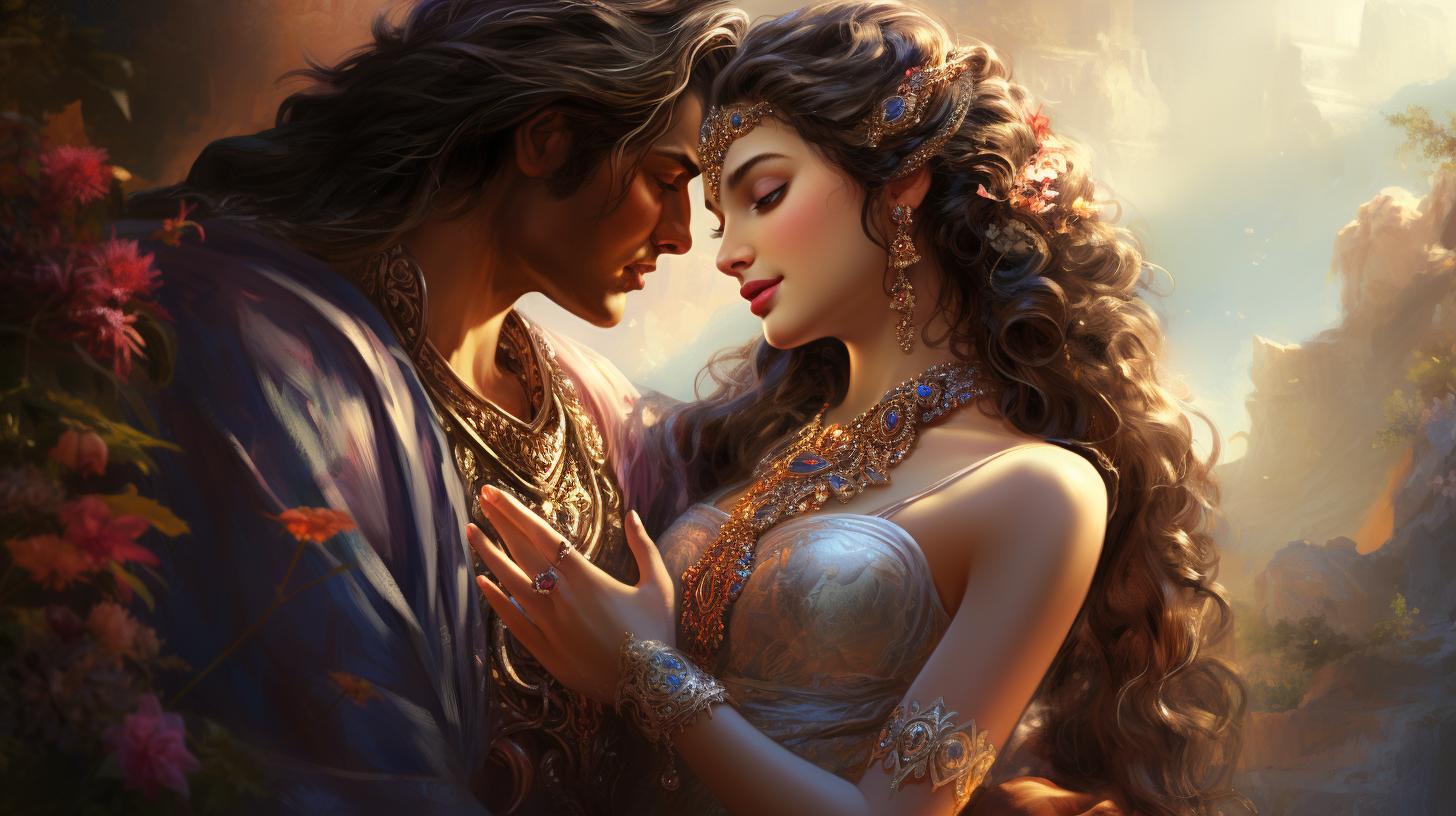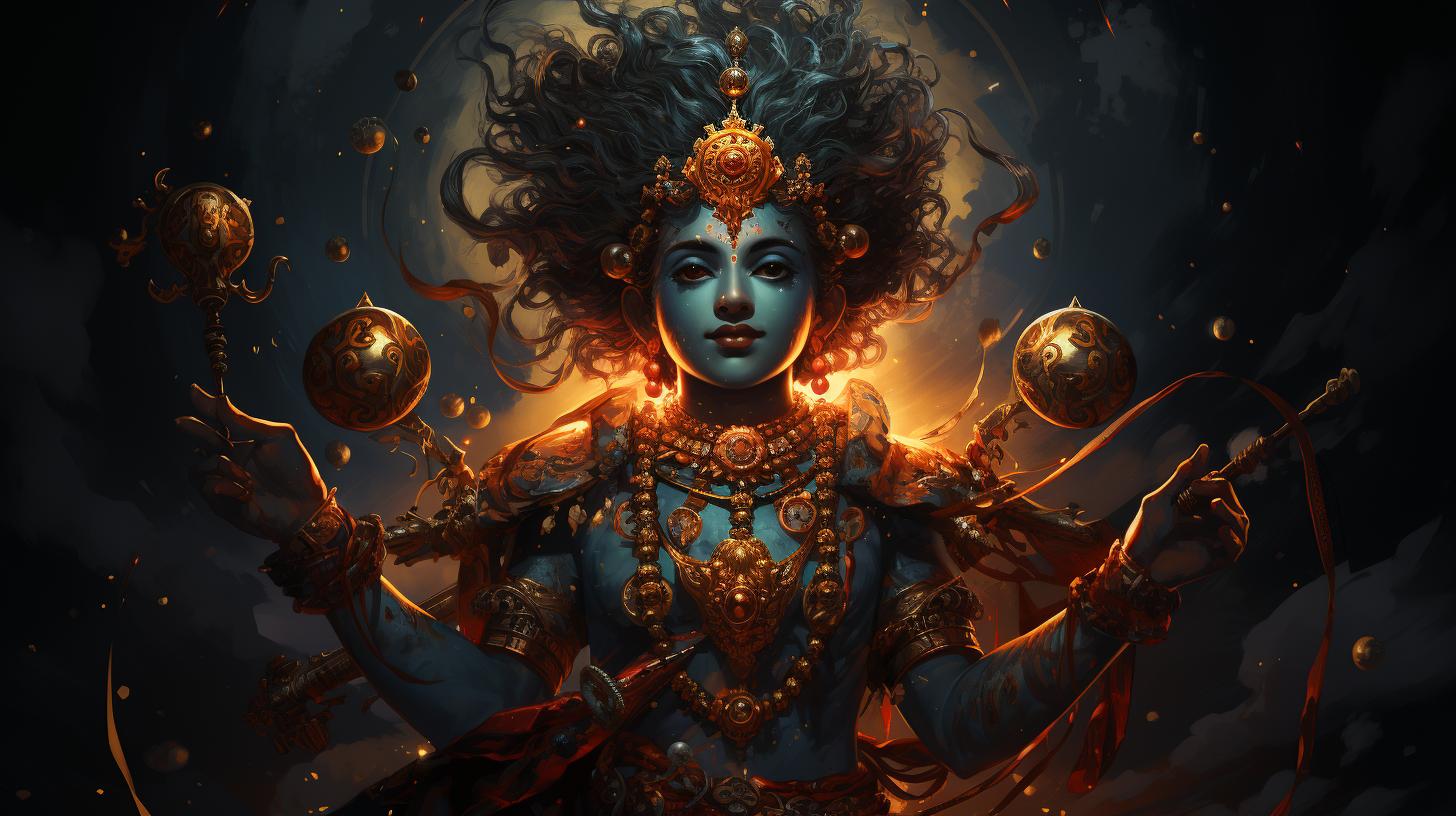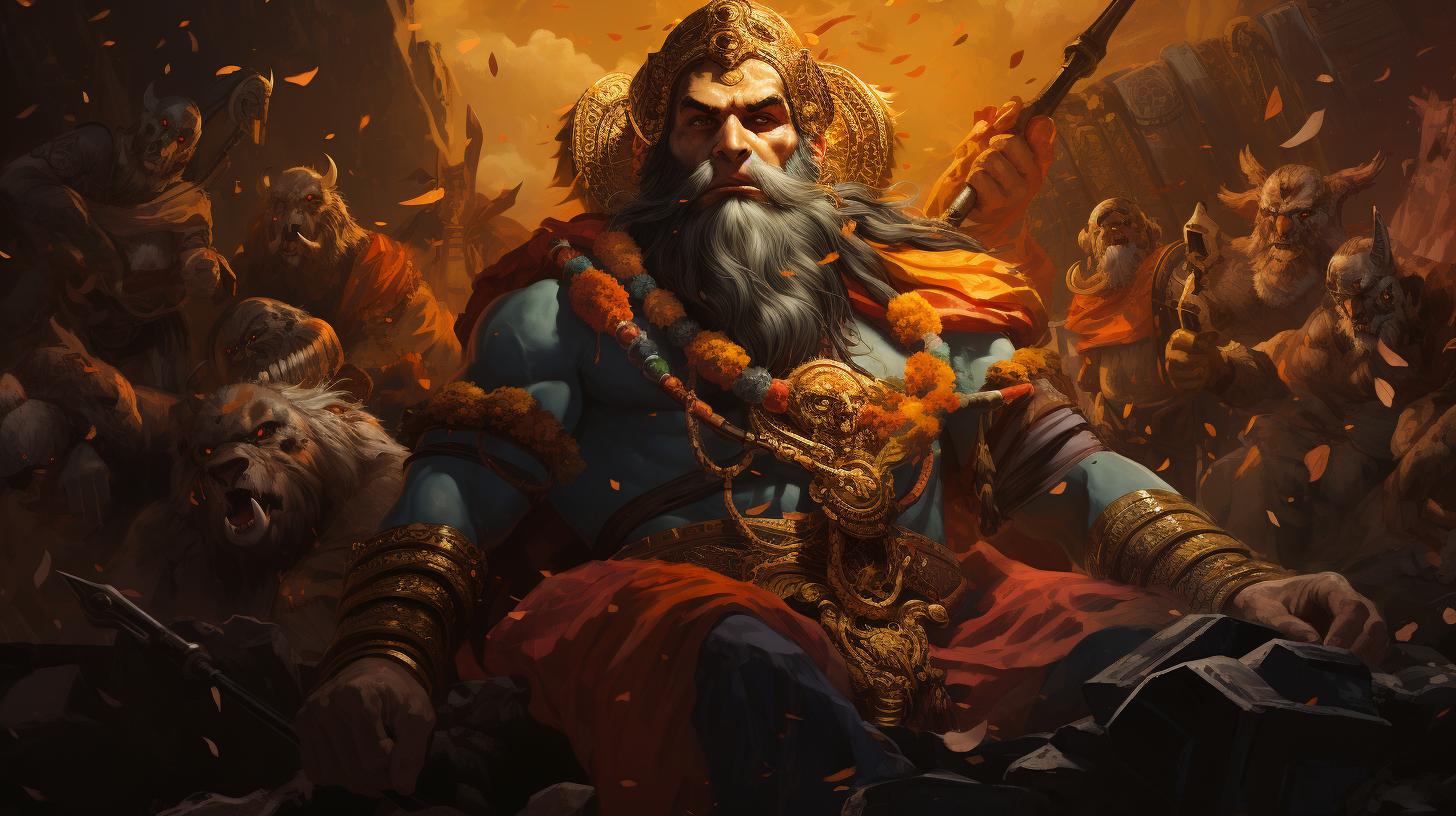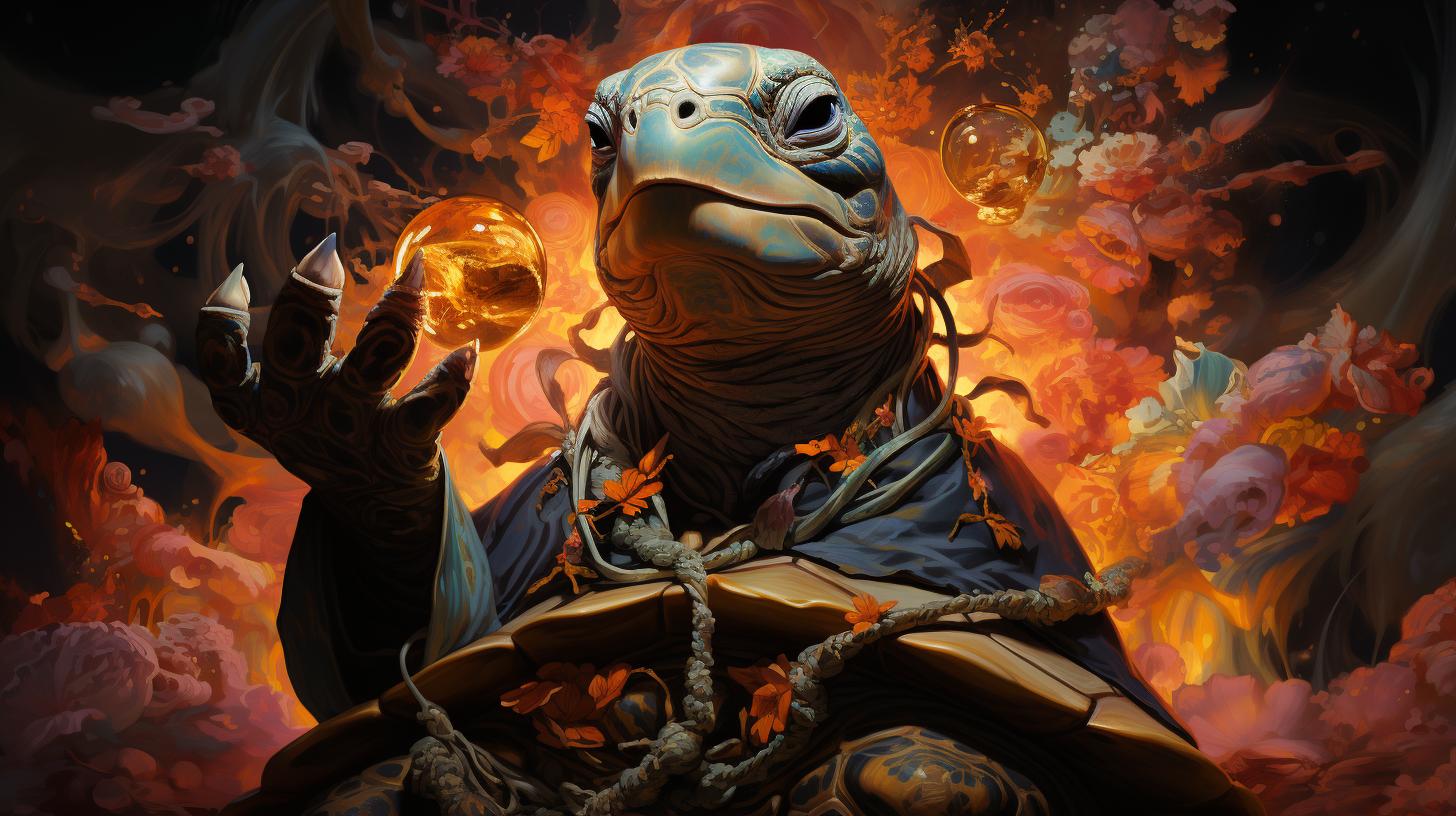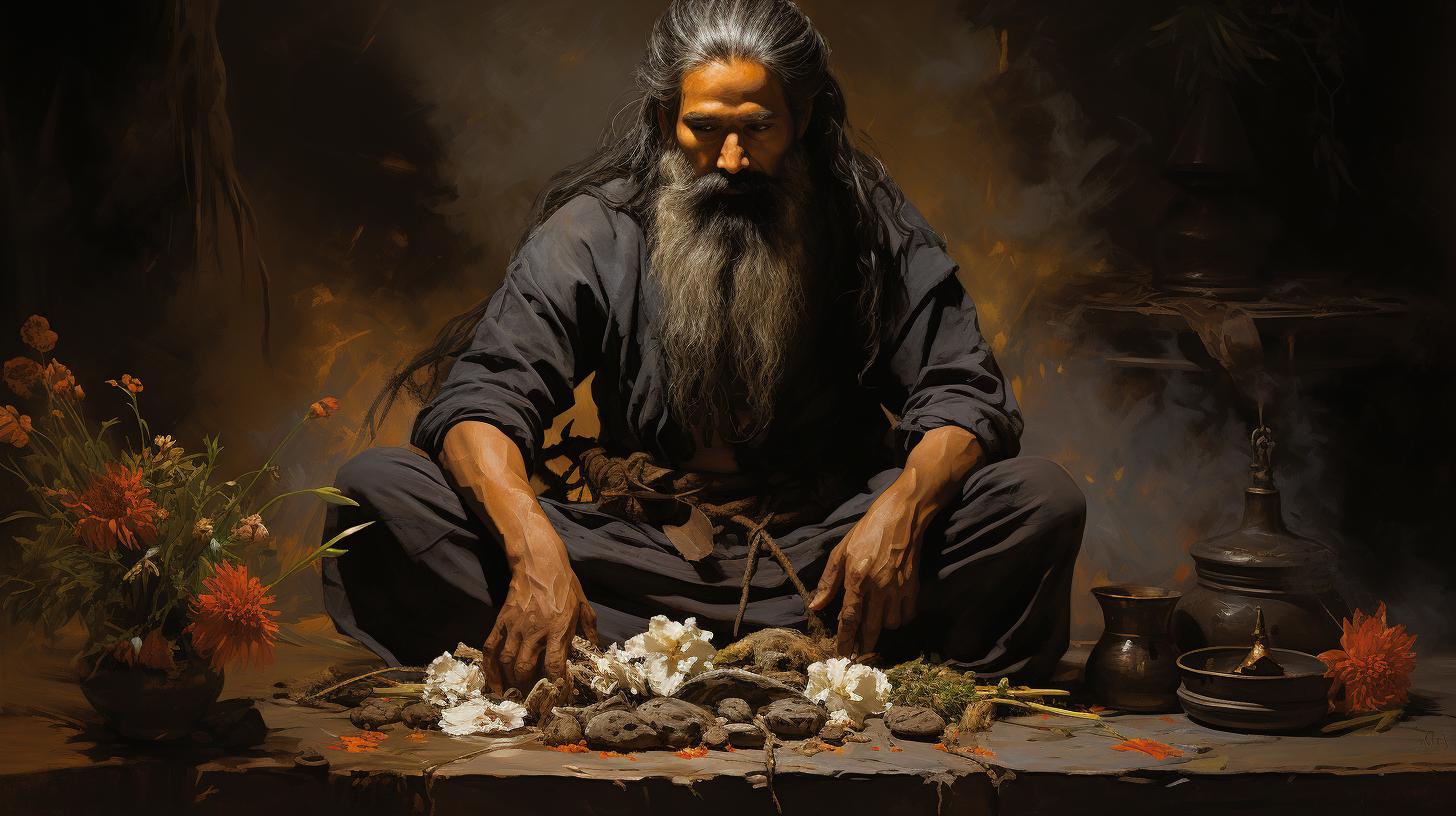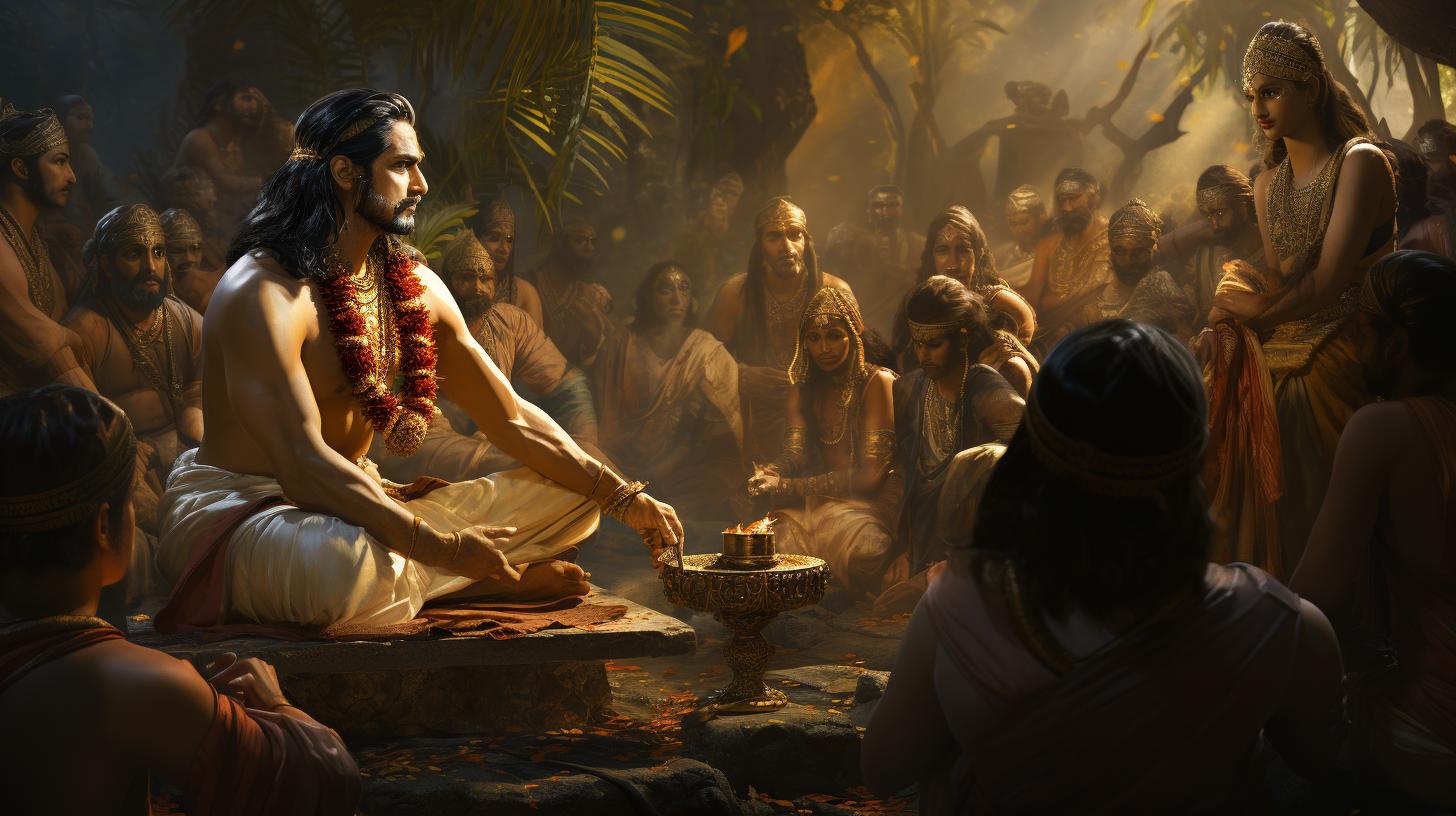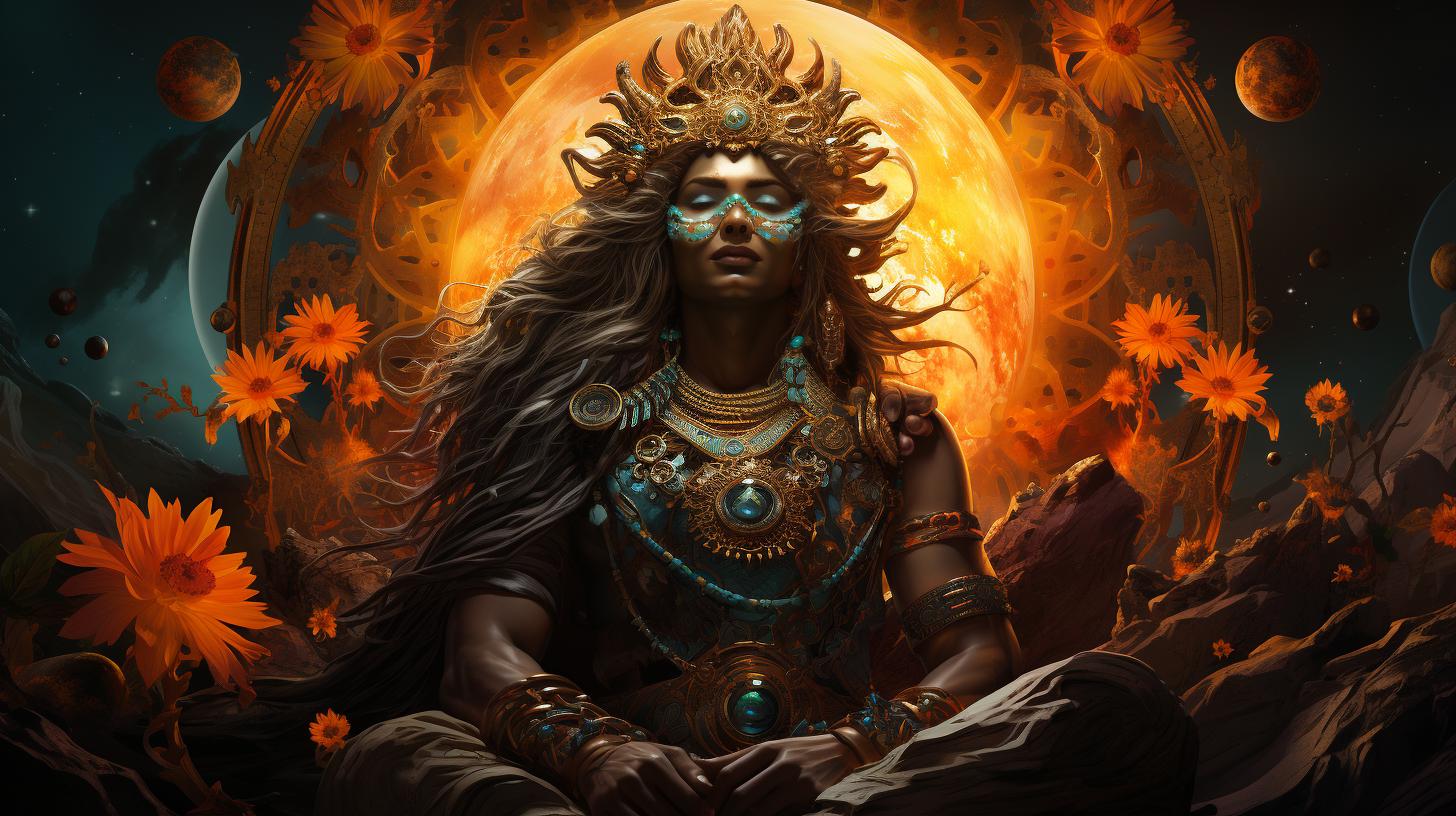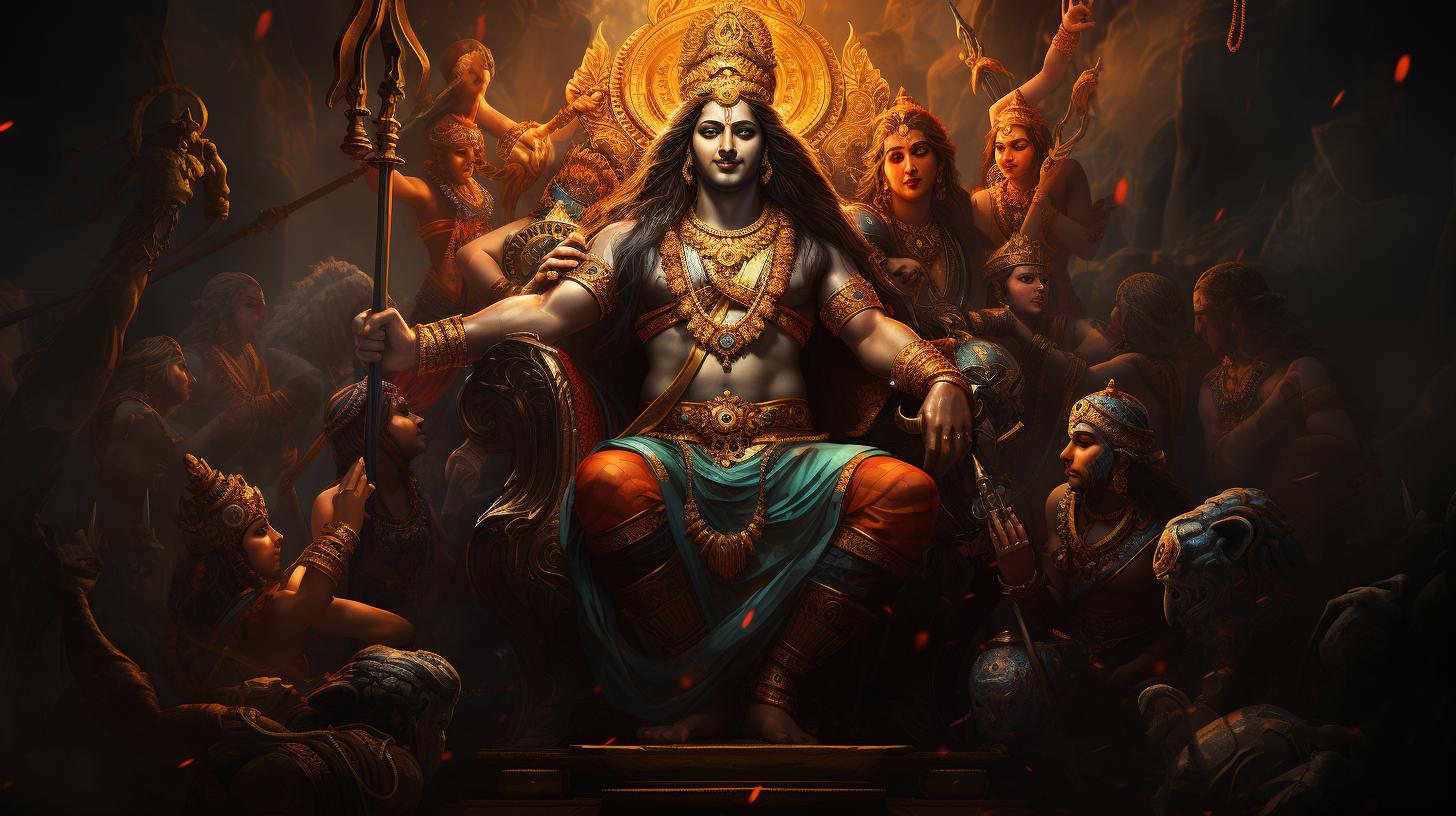‘Hindu Goddess Radha: The Divine Love and Devotion of the Beloved Companion of Krishna’
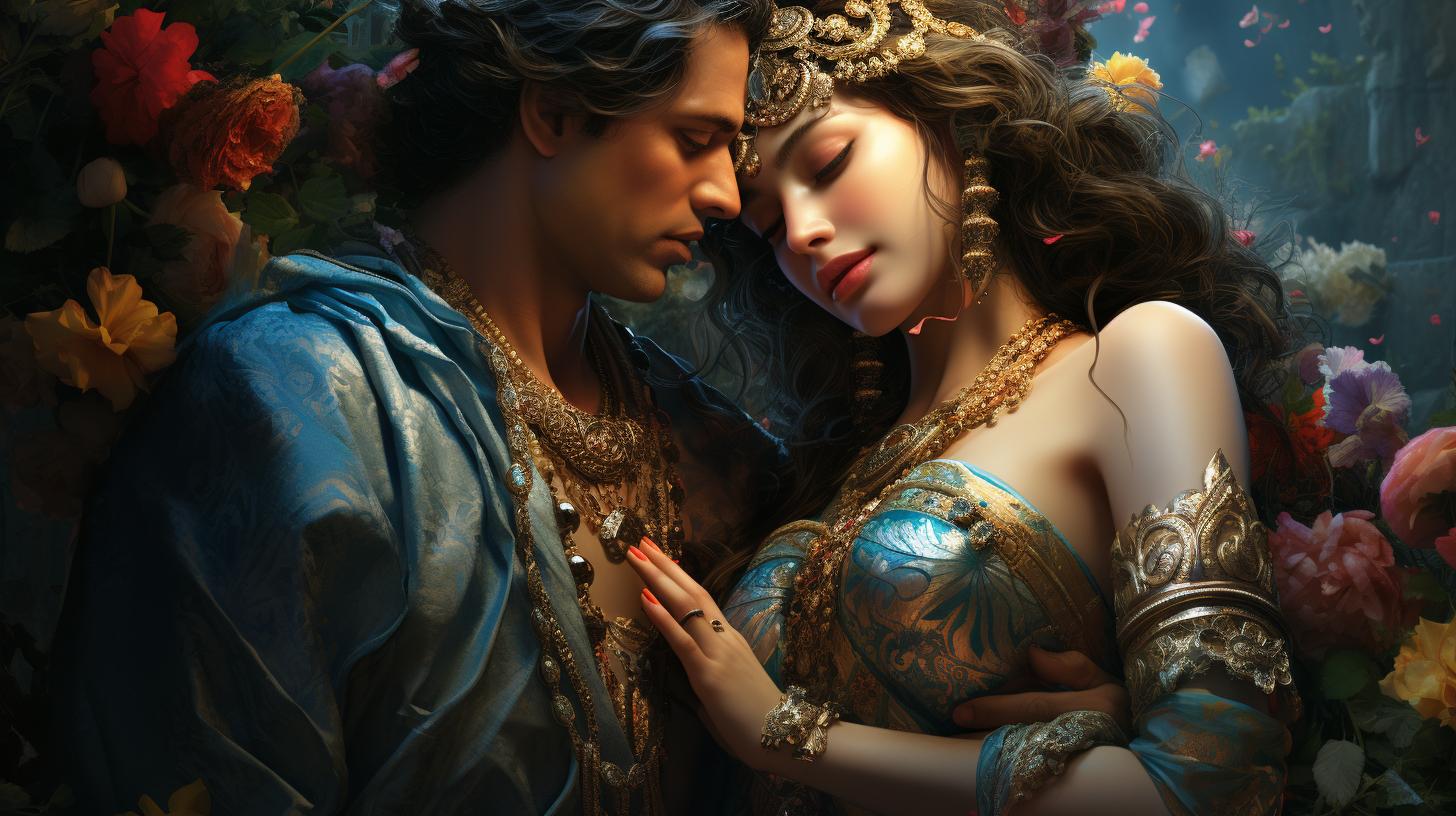
Hindu Goddess Radha is a revered figure in Hinduism, known for her divine love and devotion to Krishna. Often considered the original goddess, Radha is worshipped as the incarnation of the goddess Lakshmi. As Krishna’s beloved companion, she plays a unique and significant role in their enchanting relationship.
This article explores Radha’s mythology, her portrayal in Hindu scriptures and literature, her iconography and worship in temples, her influence in Vaishnavism, and the impact of Radha and Krishna’s love in popular culture.
Additionally, it delves into the timeless teachings and symbolism of Radha in today’s world.
The Origin and Mythology of Hindu Goddess Radha
Radha, the Hindu goddess, holds a significant place in mythology and spiritual traditions. She is closely associated with Krishna, the divine incarnation of Sri Hari Vishnu, and is revered for her role as his beloved companion and devotee.
Let’s explore the fascinating origin, mythology, and significance of Radha.
Radha and Krishna: Divine Love and Devotion
Radha and Krishna share a profound relationship characterized by divine love and devotion. Radha’s unwavering dedication and loyalty towards Krishna make her an epitome of pure affection. In their divine love story, Radha symbolizes the embodiment of love, while Krishna personifies the divine source of all creation.
Their intimate connection represents the deep bond between the individual soul (Jiva) and the supreme soul (Parmatman), highlighting the eternal love that transcends all barriers.
Radha as the Goddess Lakshmi Incarnation
Radha is often regarded as the incarnation of the Hindu goddess Lakshmi, the deity of wealth, prosperity, and spiritual abundance.
By recognizing Radha as the embodiment of Lakshmi, devotees honor her as the supreme goddess and seek her blessings for material and spiritual fulfillment. This association elevates Radha’s status and reinforces the belief in her divine nature and the immense power of her love for Krishna.
Radha’s Role as Krishna’s Beloved Companion
Despite Krishna’s official consort being Rukmini, Radha holds a unique place as his beloved companion.
Her unwavering devotion, charm, and humility touch the hearts of devotees, making her an object of deep reverence. Radha’s role in Krishna’s life transcends societal norms and represents the essence of selfless love and sacrifice.
The devotion Radha demonstrates towards Krishna serves as an inspiration for seekers on their spiritual journey, encouraging them to strive for selfless love and unwavering devotion.
Radha in Hindu Scriptures and Literature
Radha holds a significant place in Hindu scriptures and literature, with her story and symbolism explored in various texts.
Let’s delve into some of the prominent mentions of Radha in Hindu scriptures and literature.
The Bhagavad Gita and Radha’s Significance
In the sacred scripture, Bhagavad Gita, Radha is not directly mentioned by name. However, her influence and significance are subtly implied through Krishna’s teachings. Krishna emphasizes the importance of pure devotion and selfless love, qualities that are epitomized by Radha’s unwavering dedication to him.
Radha’s devotion serves as an inspiring example for Krishna’s teachings on bhakti yoga, the path of devotion.
Radha in the Brahma Vaivarta Purana
Another important scripture that highlights Radha’s role in Krishna’s divine play is the Brahma Vaivarta Purana. This text narrates various episodes from Radha and Krishna’s life, including their divine love, separation, and reunion.
Radha is portrayed as the epitome of devotion, surrender, and spiritual union with the divine. The Purana beautifully captures the depth of their relationship, touching the hearts of devotees as they immerse themselves in Radha-Krishna’s divine love.
Radha in Indian Literature and Poetry
Radha’s divine love story with Krishna transcends religious literature and has found its way into Indian literature and poetry throughout history. Poets and writers have depicted the eternal bond between Radha and Krishna, expressing their love in soul-stirring verses.
Radha’s love has been celebrated in works by Jayadeva, Surdas, and other notable poets, who capture the essence of devotion, longing, and spiritual union through their eloquent verses. These literary creations continue to inspire and deepen the understanding of Radha’s divine love in the hearts of readers.
As we explore Radha’s significance in Hindu scriptures and literature, we discover her profound influence as the embodiment of devotion, surrender, and pure love. Radha’s story, teachings, and depiction in various texts continue to resonate with devotees, inspiring them on their spiritual journey.
Radha’s Iconography and Worship
The iconography and worship of Hindu Goddess Radha hold great significance in the spiritual realm. Her representations in Hindu temples, symbolism in art, and the festivities dedicated to her showcase the devotion and love towards this divine deity.
Radha’s Representation in Hindu Temples
In Hindu temples, Radha is depicted alongside Krishna, symbolizing their eternal love and sacred partnership. She is often portrayed with Krishna as a celestial couple, entwined in a divine dance or engaged in playful interactions.
The presence of Radha in these sacred spaces amplifies the spiritual connection with Krishna, welcoming devotees to experience the profound bond of love and devotion.
Radha’s Symbolism and Depictions in Art
Radha’s symbolism in art reflects her divine qualities and devotion to Krishna. She is represented as the epitome of beauty, grace, and compassion, captivating the hearts of both devotees and artists.
Paintings, sculptures, and illustrations depict Radha adorned with exquisite jewelry, vibrant garments, and a serene countenance, emphasizing her eternal bond with Krishna and the essence of pure love.
Festivals and Rituals Dedicated to Goddess Radha
A multitude of festivals and rituals are dedicated to Goddess Radha, celebrating her divine presence and significant role in Hindu mythology.
One of the most prominent festivals is Radhashtami, which commemorates Radha’s birth anniversary. Devotees partake in devotional singing, dance performances, and elaborate processions to express their love and devotion towards Radha.
Other rituals, like Radha Kalyanam (Radha’s divine marriage ceremony), Rasa Lila (sacred dance depicting Radha and Krishna’s love), and Radha Jayanti (Radha’s appearance day celebration), provide opportunities for devotees to immerse themselves in the divine energy of Radha’s presence.
Radha’s Influence in Vaishnavism and Hindu Devotion
Radha holds immense importance in various sects of Vaishnavism, a prominent branch of Hinduism. Her influence extends beyond her divine love and devotion to Krishna, shaping the beliefs and practices of millions of devotees.
Radha’s Importance in Vaishnavism Sects
Radha is highly revered in Vaishnavism, particularly in the sects that focus on her worship. Devotees believe that Radha’s spiritual love exemplifies the ultimate form of devotion towards Krishna. Her eternal relationship with Krishna symbolizes the ideal union of the individual soul (jiva) with the Supreme Soul (Paramatma).
In the Gaudiya Vaishnavism tradition, founded by Chaitanya Mahaprabhu, Radha’s love for Krishna is considered the highest spiritual aspiration. Devotees strive to imbibe her selfless devotion and consider her intercession crucial in obtaining Krishna’s grace and divine transcendence.
Saints and Devotees in Radha and Krishna’s Bhakti Tradition
Throughout history, numerous saints and devotees have emerged within the Bhakti (devotional) tradition of Radha-Krishna. Their teachings and spiritual experiences reflect the essence of Radha’s devotion and love.
Saints like Mirabai, Surdas, Jayadeva, and Chandidas composed sublime poetry and bhajans (devotional songs) expressing their intense love and longing for Radha-Krishna. These poetic expressions kindled deep devotion among their followers and the larger community of devotees.
Their bhakti-centric philosophy emphasized the central role of Radha in attaining spiritual bliss and union with Krishna. They preached the significance of surrendering oneself to Radha’s love, considering it a path to liberation and ultimate salvation.
Radha’s Devotion and Love as a Spiritual Path
The devotion and love exhibited by Radha towards Krishna serve as an inspiration and guide for spiritual seekers. Radha’s unwavering dedication and selflessness teach the importance of surrendering one’s ego and desires in the pursuit of divine love.
Radha’s devotion offers valuable spiritual lessons, highlighting the power of pure love to transcend worldly attachments and attain spiritual enlightenment. Through her love for Krishna, Radha teaches that the path to the divine lies in unwavering faith, complete surrender, and selfless devotion.
Devotees invoke Radha’s blessings to deepen their own spiritual journey and seek inner transformation. They aspire to imbibe her qualities of profound love, sacrifice, and unwavering loyalty, striving to reach the ecstatic state of divine union experienced by Radha and Krishna.
- Radha’s love and devotion in Vaishnavism inspire devotees to seek spiritual union with Krishna.
- Saints and poets within the Bhakti tradition have sung praises of Radha’s divine love.
- Radha’s devotion serves as a spiritual path emphasizing surrender and selfless love.
Radha and Krishna in Popular Culture and Contemporary Impact
Radha and Krishna’s divine love has greatly influenced popular culture in India and beyond.
Their story has been depicted and celebrated through various art forms, including music, dance, films, and literature. These creative expressions not only entertain but also serve as a medium to convey the profound teachings and symbolism of Radha and Krishna’s eternal bond.
Radha and Krishna in Indian Music and Dance
Indian music and dance traditions have beautifully portrayed the love and devotion of Radha and Krishna. Classical music genres like Bhajans and Kirtans often feature enchanting compositions dedicated to Radha’s love for Krishna. Renowned musicians and singers have composed soul-stirring melodies capturing the essence of their divine romance.
Similarly, classical dance forms like Bharatanatyam and Odissi showcase elaborate performances depicting the divine play of Radha and Krishna.
Radha-Krishna Love and Its Representation in Films
Hindi cinema, commonly known as Bollywood, has embraced Radha and Krishna’s love story, incorporating it into numerous films. These movies beautifully portray the eternal love, separation, and longing experienced by Radha and Krishna. The mesmerizing songs, emotional performances, and captivating storytelling have made these films an integral part of Indian cinema’s cultural heritage.
Radha’s Influence on Modern Hindu Art and Literature
The influence of Radha extends into the realm of modern Hindu art and literature. Contemporary artists have depicted Radha’s grace and beauty through paintings, sculptures, and digital art. Writers and poets continue to be inspired by Radha’s devotion, crafting literary works that explore the depth of her love for Krishna. Through these artistic mediums, Radha’s timeless presence in Hindu culture continues to inspire and evoke a sense of spiritual connection.
Exploring Radha’s Symbolism and Teachings in Today’s World
The significance of Radha’s symbolism and teachings extends beyond ancient mythology, resonating with seekers of spiritual connection and inner peace in the modern world. Delving into Radha’s teachings on love, compassion, and devotion provides valuable insights for navigating the complexities of life and cultivating deeper relationships.
Radha’s Teachings on Love, Compassion, and Devotion
Radha’s divine love for Krishna serves as a profound example of unconditional devotion and selfless affection. Her teachings inspire individuals to embrace love as a transformative force and cultivate compassion towards all beings.
Radha’s devotion teaches us to surrender our egos and immerse ourselves in pure, selfless love, fostering empathy and kindness towards others.
Through Radha’s teachings, we learn that true love demands sacrifice and unwavering commitment.
By embracing Radha’s teachings, individuals can strive to deepen their connections, not only with their loved ones but also with the world around them. Radha’s message of love reminds us to see the divine in everyone, fostering unity and harmony.
Radha’s Relevance in Finding Spiritual Connection and Inner Bliss
Radha’s symbolism transcends earthly boundaries and guides seekers towards spiritual connection and inner bliss. Her love for Krishna represents the yearning for union with the divine and serves as a reminder of the eternal spiritual journey.
Exploring Radha’s teachings helps individuals find solace in their quest for spiritual enlightenment.
Radha’s path encourages individuals to dive deep within, seeking the union of the soul with the divine. Through devotion, meditation, and self-discovery, followers of Radha can attain a state of inner bliss and transcendence.
Radha’s teachings offer guidance in navigating the challenges of life and finding fulfillment in spiritual growth.
Understanding the Universal Message of Radha-Krishna’s Divine Love
The divine love shared between Radha and Krishna carries a universal message that transcends cultural and religious boundaries. It embodies the eternal bond between the individual soul and the divine essence.
By understanding and embracing Radha-Krishna’s divine love, individuals can discover a deeper connection to the universal energy that permeates all of existence.
The message of Radha-Krishna’s divine love teaches us that love knows no boundaries or limitations.
It inspires individuals to seek unity and harmony in all aspects of life, embracing diversity and accepting the inherent beauty within each soul. Radha’s teachings spur individuals on a quest to unlock their own capacity for love, compassion, and spiritual growth.
- Embrace love as a transformative force
- Cultivate compassion and kindness towards all beings
- Surrender ego and immerse in pure, selfless love
- Deepen connections through sacrifice and commitment
- Seek spiritual connection and inner bliss
- Find solace in the eternal spiritual journey
- Discover unity and harmony through devotion
- Achieve a state of transcendence and inner fulfillment
- Embrace the universal message of love beyond boundaries
- Seek unity and harmony, embracing diversity
By exploring Radha’s symbolism and teachings, individuals can tap into the profound wisdom and timeless guidance that she offers.
Radha’s teachings continue to inspire seekers of truth and provide a roadmap for embracing love, finding spiritual connection, and unlocking the transformative power of devotion.
.











